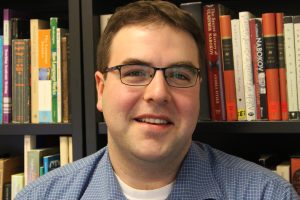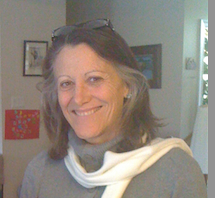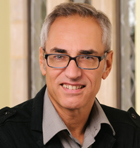 Michael Marsh-Soloway, Ph.D., is the Director of the Global Studio at the University of Richmond. Serving primarily the Departments of Languages, Literatures, and Cultures (LLC) and Latin American, Latino, and Iberian Studies (LALIS), Michael delivers instructional design consultations and workshops to faculty and students to share innovative uses of technology for pedagogy and research. In addition to teaching third-year Russian, he oversees the Self-Directed Language Acquisition Program (SDLAP), advises Fulbright Foreign Language Teaching Assistants (FLTAs), and collaborates closely with the Offices of International Education, Institutional Effectiveness, and Academic Skills Center. He recently presented at ACTFL on peer-assessment activities, and intensive theme-based instruction (ITI). Currently, Michael is attempting to publish his doctoral dissertation on Dostoevsky as an academic monograph, and he will be developing digital pedagogical resources for a Chinese textbook that he is co-authoring with colleagues at Arizona State University and the University of Virginia.
Michael Marsh-Soloway, Ph.D., is the Director of the Global Studio at the University of Richmond. Serving primarily the Departments of Languages, Literatures, and Cultures (LLC) and Latin American, Latino, and Iberian Studies (LALIS), Michael delivers instructional design consultations and workshops to faculty and students to share innovative uses of technology for pedagogy and research. In addition to teaching third-year Russian, he oversees the Self-Directed Language Acquisition Program (SDLAP), advises Fulbright Foreign Language Teaching Assistants (FLTAs), and collaborates closely with the Offices of International Education, Institutional Effectiveness, and Academic Skills Center. He recently presented at ACTFL on peer-assessment activities, and intensive theme-based instruction (ITI). Currently, Michael is attempting to publish his doctoral dissertation on Dostoevsky as an academic monograph, and he will be developing digital pedagogical resources for a Chinese textbook that he is co-authoring with colleagues at Arizona State University and the University of Virginia.
 Kathryn Murphy-Judy, Ph.D., is Director of the Liberal Studies for Early & Elementary Education and Associate Professor of French at Virginia Commonwealth University School of World Studies. She has been active in technology enhanced learning since the 1970s. She creates and runs the Basic Online Language Design and Delivery Collaboratory (BOLDD), giving workshops on the design and delivery of online learning with the group. She has edited and co-edited two volumes on CALL (Nexus: The Convergence of Language Teaching and Research Using Technology and Preparing and Developing Technology-Proficient L2 Teachers)
Kathryn Murphy-Judy, Ph.D., is Director of the Liberal Studies for Early & Elementary Education and Associate Professor of French at Virginia Commonwealth University School of World Studies. She has been active in technology enhanced learning since the 1970s. She creates and runs the Basic Online Language Design and Delivery Collaboratory (BOLDD), giving workshops on the design and delivery of online learning with the group. She has edited and co-edited two volumes on CALL (Nexus: The Convergence of Language Teaching and Research Using Technology and Preparing and Developing Technology-Proficient L2 Teachers)
as well as many articles and postings. She is currently working with a team of VCU faculty on a digital curation project to create student-driven OER learning modules.

Cristina (Cris) P. Sparks-Early is an Asst. Professor of Spanish at Northern Virginia Community College in Manassas, Virginia and Asst. Division Dean for World Languages. Cris has been teaching Spanish for 25 years, 20 of those at NVCC. She has served as the Chair of the World Languages Cluster, the VCCS Peer Group, and serves on numerous committees on her campus. She is the three-time recipient of the Alumni Federation Outstanding Faculty Award (2000, 2007 and 2015). Cris was born and raised in Madrid, Spain, and spent her childhood living in Spain, Italy and Germany before moving to the United States as an adolescent. Living now in Virginia, she continues to travel to numerous countries including the Dominican Republic, Puerto Rico, Mexico, Costa Rica, Argentina, Chile and Cuba. Additionally, she was part of an educational delegation to China through The College Board in 2012. Her teaching experience includes traditional and hybrid courses, and has a special interest in assessing using IPAs. Cris has facilitated workshops on collaboration, creating communicative classrooms and creating and implementing IPAs. Cris has three adolescent children, and thus has little free time. She enjoys traveling, music, cooking, reading, dancing, knitting and spending time with friends and family.
 Keith W. McIntosh has served as the vice president for Information Services and chief information officer (CIO) at the University of Richmond since August 1, 2016. He leads 74 staff and is responsible for the day-to-day management and strategic development of the university’s Information Services organization. Mr. McIntosh brings more than 30 years of experience in information technology services within higher education and the military. Prior to joining the University of Richmond he was the CIO at Ithaca College in Ithaca, New York, CIO at Pima County Community College District in Tucson, Arizona, and held various progressive leadership and management positions within information technology during his distinguished 24.5 year service in the United States Air Force including a combat tour in Northern Iraq. Mr. McIntosh earned an M.B.A. with a concentration in information technology management from Trident University International, a B.S. in management information systems from Bellevue University, and an A.A.S. in information systems technology from the Community College of the Air Force. He is a Frye Leadership Institute Fellow and has served in numerous leadership roles within EDUCAUSE. Mr. McIntosh is an accomplished speaker, author, and thought leader about such topics as leadership, professional development, and mentoring. He is a stalwart champion for diversity and inclusion. He is the first CIO to serve on the National Association of College and University Business Officers (NACUBO) Board. His peers elected him to serve a 4-year term on the EDUCAUSE Board of Directors starting October 2017. He is the first person to serve on the EDUCAUSE and NACUBO Board simultaneously. Keith also serves on the Advisory Board of the Center for Higher Education Chief Information Officer Studies (CHECS) and serves on the Leadership Board for CIOs. The Governor of Virginia appointed him to serve on the Virginia War Memorial Board starting July 1, 2017. He was the inaugural recipient of the EDUCAUSE Rising Star Award in 2011.
Keith W. McIntosh has served as the vice president for Information Services and chief information officer (CIO) at the University of Richmond since August 1, 2016. He leads 74 staff and is responsible for the day-to-day management and strategic development of the university’s Information Services organization. Mr. McIntosh brings more than 30 years of experience in information technology services within higher education and the military. Prior to joining the University of Richmond he was the CIO at Ithaca College in Ithaca, New York, CIO at Pima County Community College District in Tucson, Arizona, and held various progressive leadership and management positions within information technology during his distinguished 24.5 year service in the United States Air Force including a combat tour in Northern Iraq. Mr. McIntosh earned an M.B.A. with a concentration in information technology management from Trident University International, a B.S. in management information systems from Bellevue University, and an A.A.S. in information systems technology from the Community College of the Air Force. He is a Frye Leadership Institute Fellow and has served in numerous leadership roles within EDUCAUSE. Mr. McIntosh is an accomplished speaker, author, and thought leader about such topics as leadership, professional development, and mentoring. He is a stalwart champion for diversity and inclusion. He is the first CIO to serve on the National Association of College and University Business Officers (NACUBO) Board. His peers elected him to serve a 4-year term on the EDUCAUSE Board of Directors starting October 2017. He is the first person to serve on the EDUCAUSE and NACUBO Board simultaneously. Keith also serves on the Advisory Board of the Center for Higher Education Chief Information Officer Studies (CHECS) and serves on the Leadership Board for CIOs. The Governor of Virginia appointed him to serve on the Virginia War Memorial Board starting July 1, 2017. He was the inaugural recipient of the EDUCAUSE Rising Star Award in 2011.
 Corrado Corradini is the Assistant Director of the Spanish Intensive Language Program at the University of Richmond in the Department of Latin American, Latino, and Iberian Studies (LALIS). He completed his studies at the universities of Pisa, Italy; Alcalá de Henares, Spain; and University of North Carolina at Chapel Hill, N.C. He has taught Spanish and Italian at several institutions of higher education in N.C., Wake Forest U. and Duke U. among them. Presently, he is the Assistant Director of the Spanish Program at the U. of Richmond, VA. His area of specialty is the narratology of early romance narrative and folklore, and he is particularly interested in the universal literary motifs and symbols.
Corrado Corradini is the Assistant Director of the Spanish Intensive Language Program at the University of Richmond in the Department of Latin American, Latino, and Iberian Studies (LALIS). He completed his studies at the universities of Pisa, Italy; Alcalá de Henares, Spain; and University of North Carolina at Chapel Hill, N.C. He has taught Spanish and Italian at several institutions of higher education in N.C., Wake Forest U. and Duke U. among them. Presently, he is the Assistant Director of the Spanish Program at the U. of Richmond, VA. His area of specialty is the narratology of early romance narrative and folklore, and he is particularly interested in the universal literary motifs and symbols.

Ryan Brazell (he/they) is an academic technologist at the University of Richmond and former president of the Southwest Association for Language Learning Technology (SWALLT). Ryan is interested in digital surveillance, privacy, and data ethics and ownership within higher education; his first question is never which, but whether technology.
